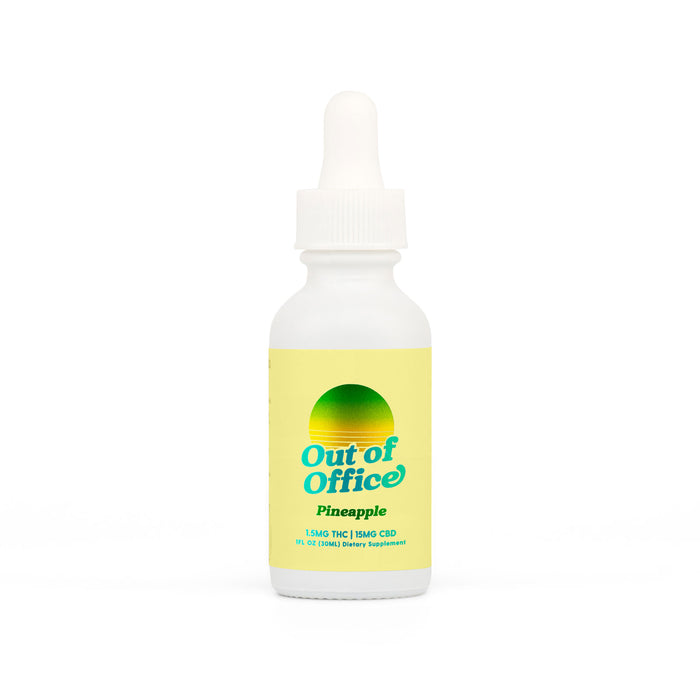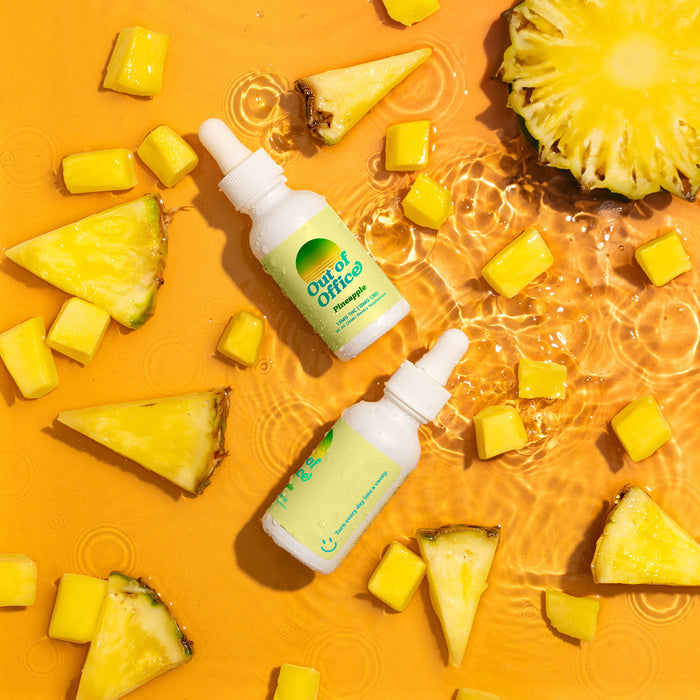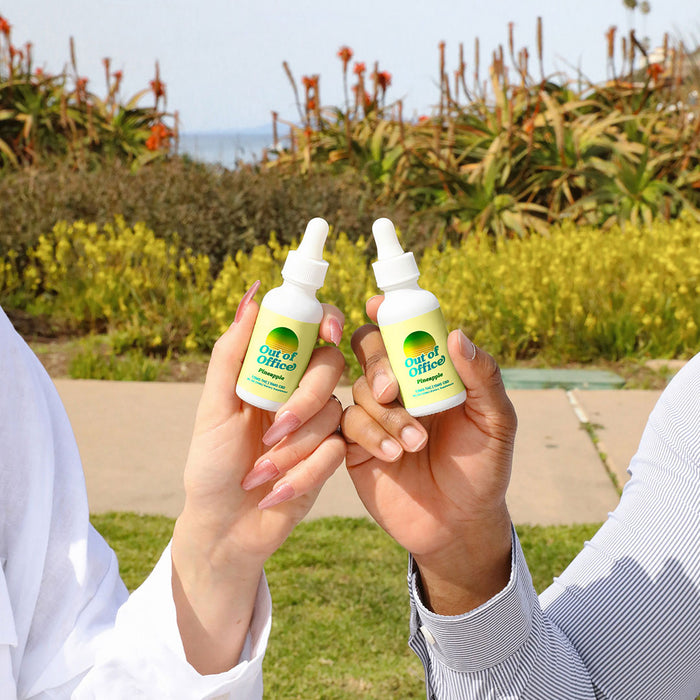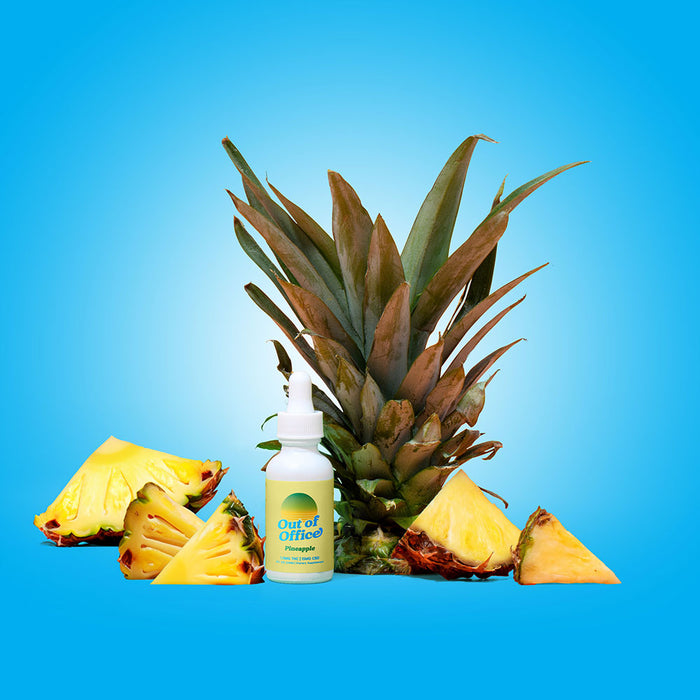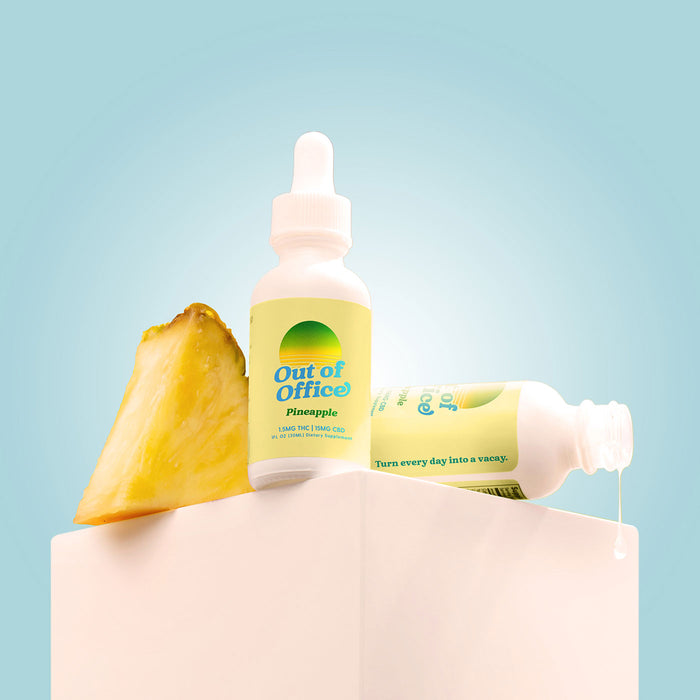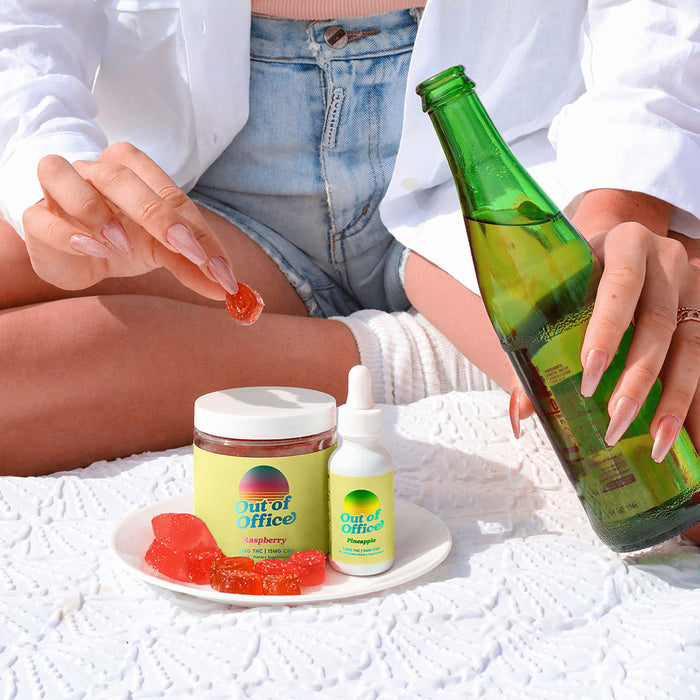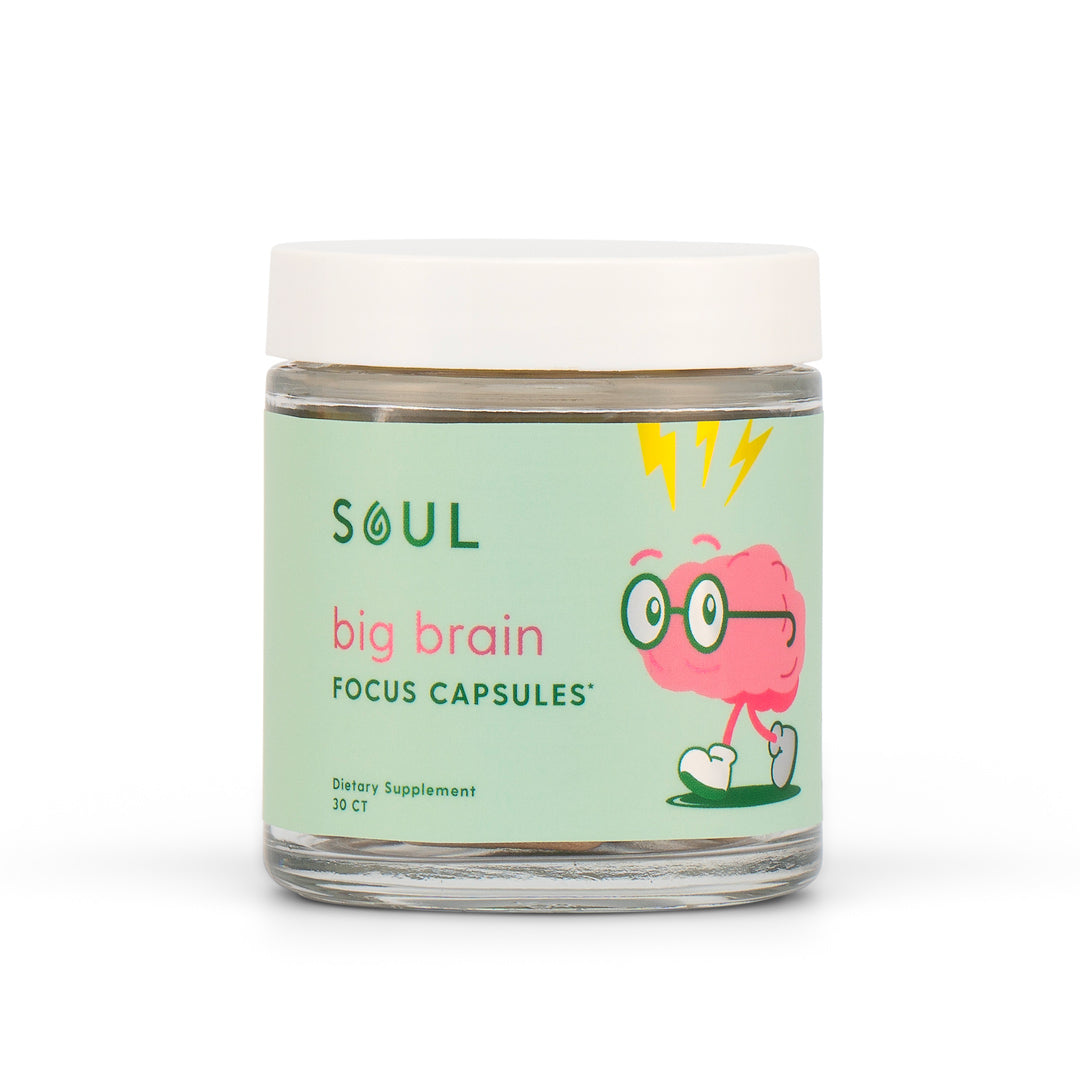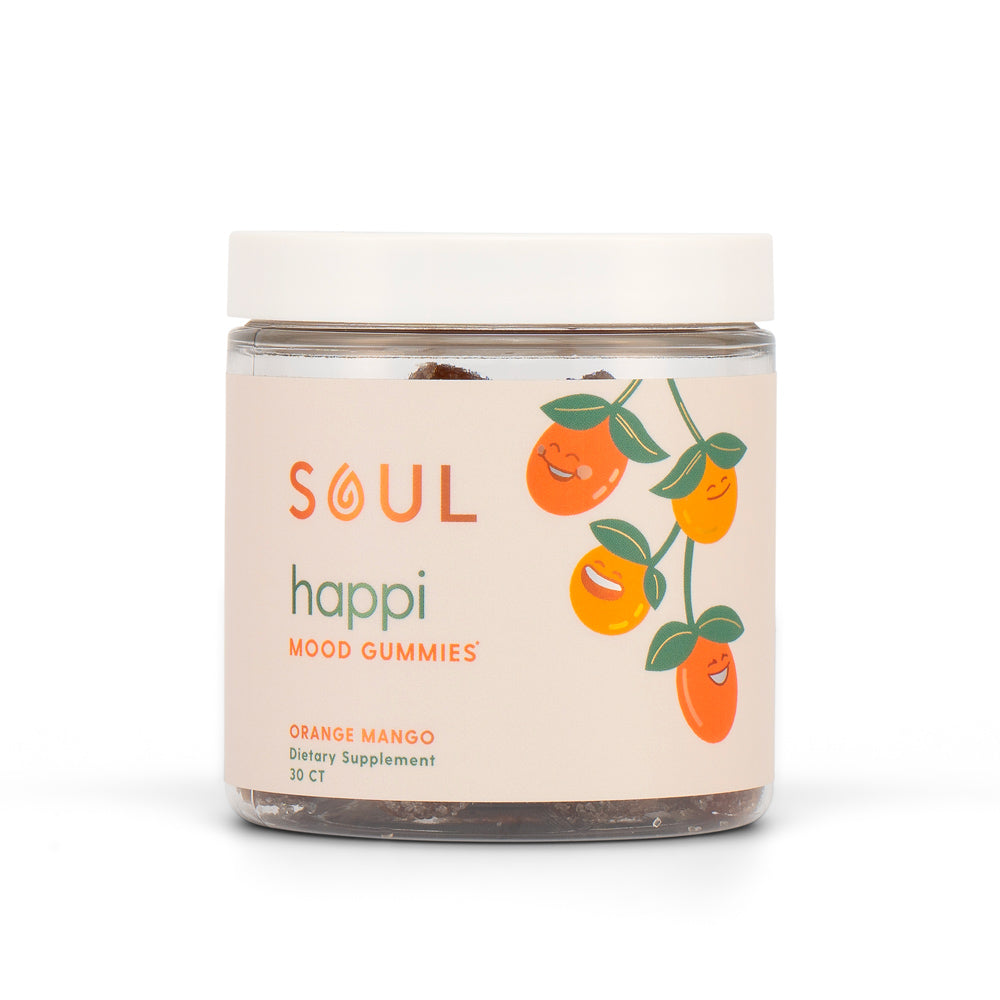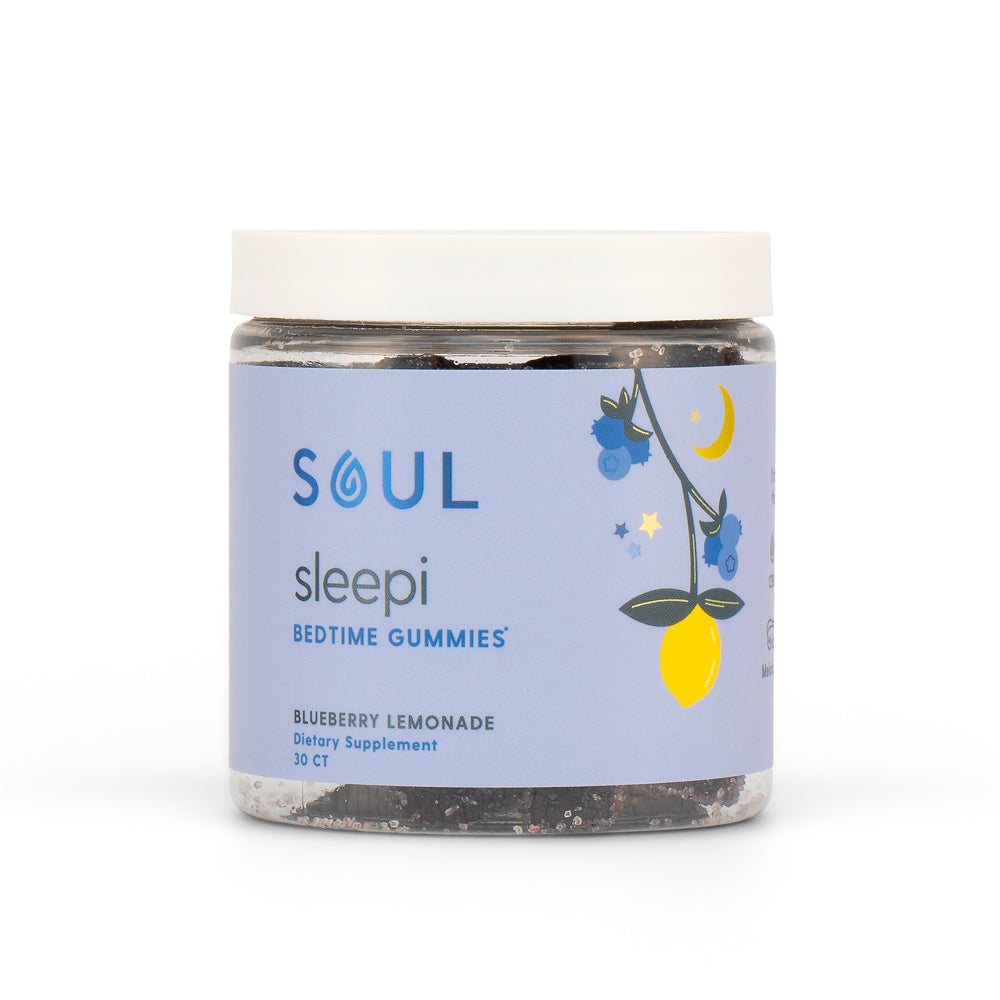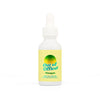
Out of Office THC Oil Drops

3MG THC

1.5MG THC
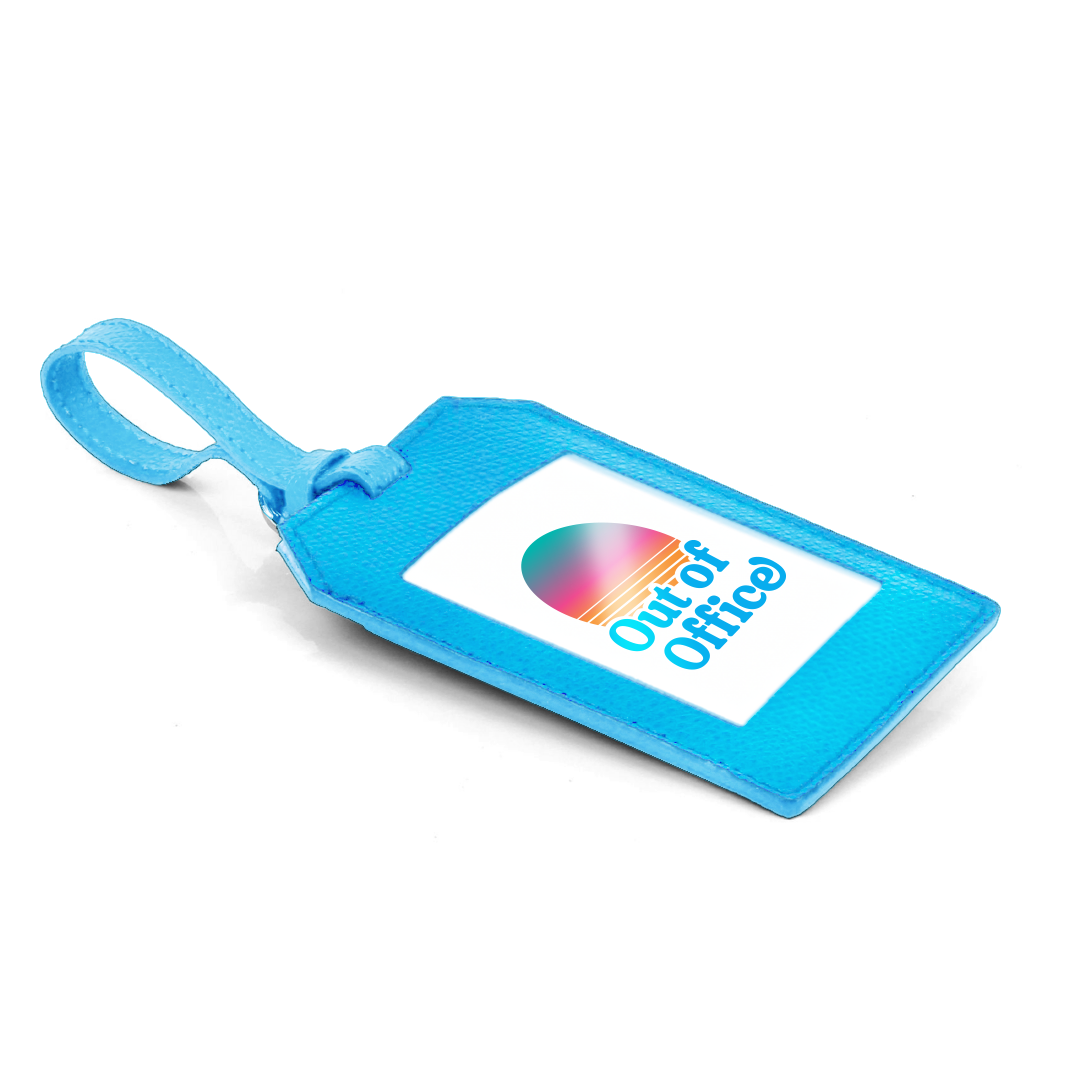
Which OOO Oil Drops Are Right For You?
Find Out Which Out Of Office Oil Drops
Deliver The High You Desire.
The Single
1.5MG THC | 15Mg CBD
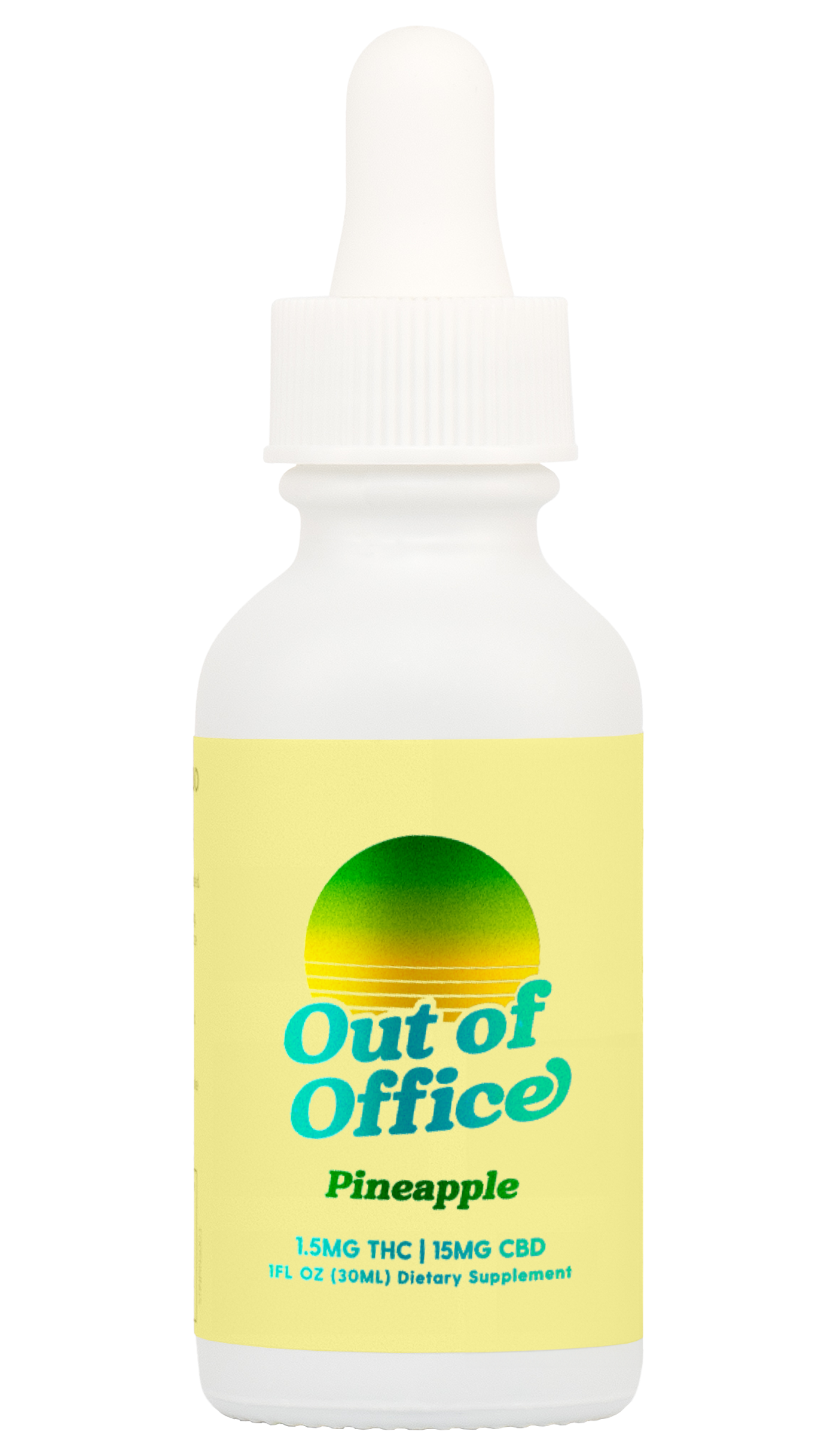
- Destination: Gentle Microdose
- Traveler:
New THC Users, Anyone
Seeking A Subtle Lift - Itinerary:
Checking emails, writing
songs, and feeling vacay
vibes at noon.
The Double
3MG THC | 30MG CBD
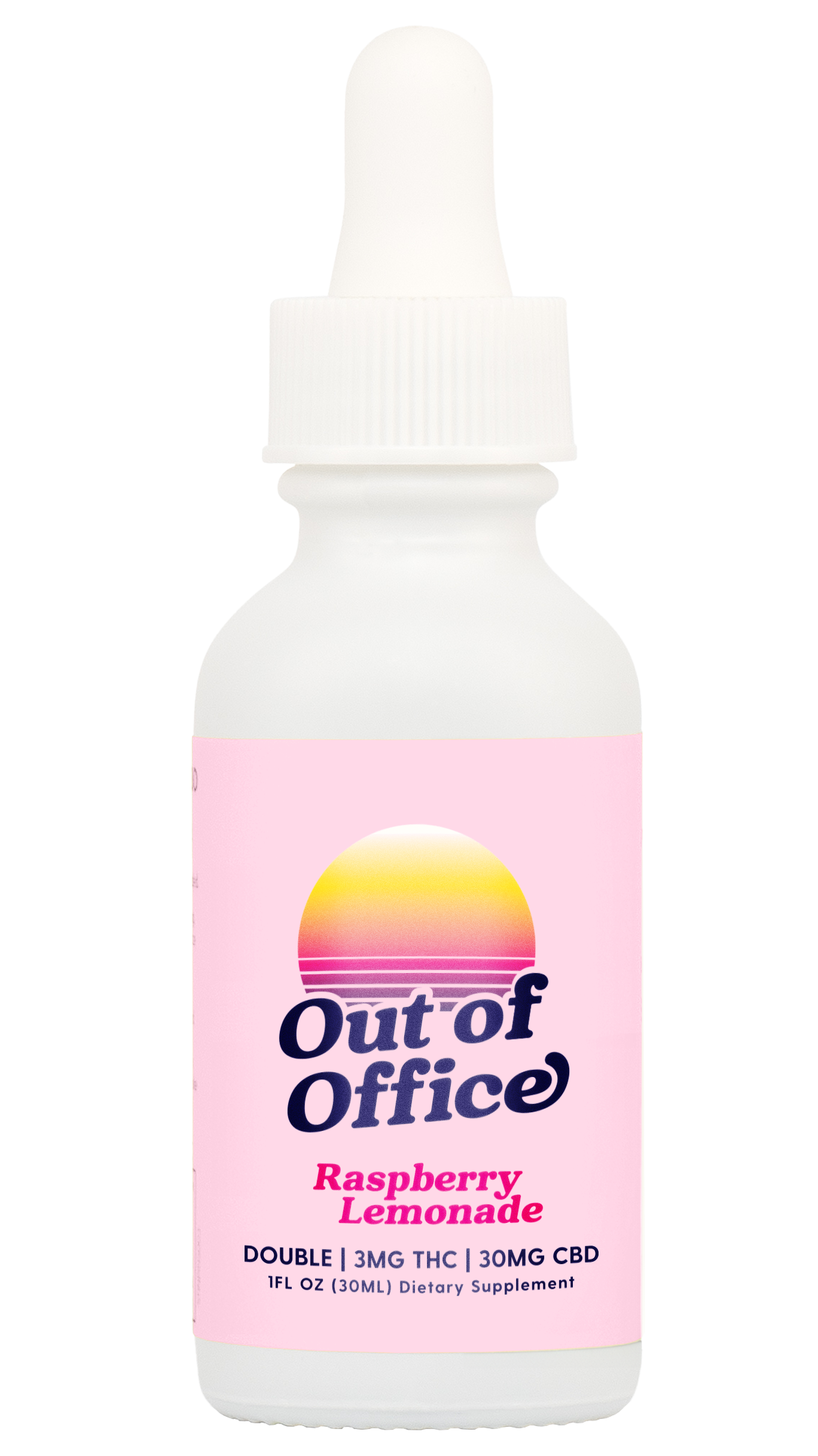
- Destination: Perfect Buzz
- Traveler:
Veterans, New Users
Ready For More - Itinerary:
Watching a movie, going
for a jog, meeting friends
out at the bar.
What To Expect
Unwind Like You’re On Vacay.
These delightful little drops are fast acting, without being overwhelming.
You get a mild buzz, without having to drink. Oil drops > hangovers!
Whether you've got a full inbox to clear or you're creating a symphony, Out of Office can help you get there.
We know melatonin isn't for everyone. With Out of Office, your sleep can still be on point!
We know how to make everything taste great. Did you expect anything less?
How To Use
Raise Your Drops, Not Your Glass.

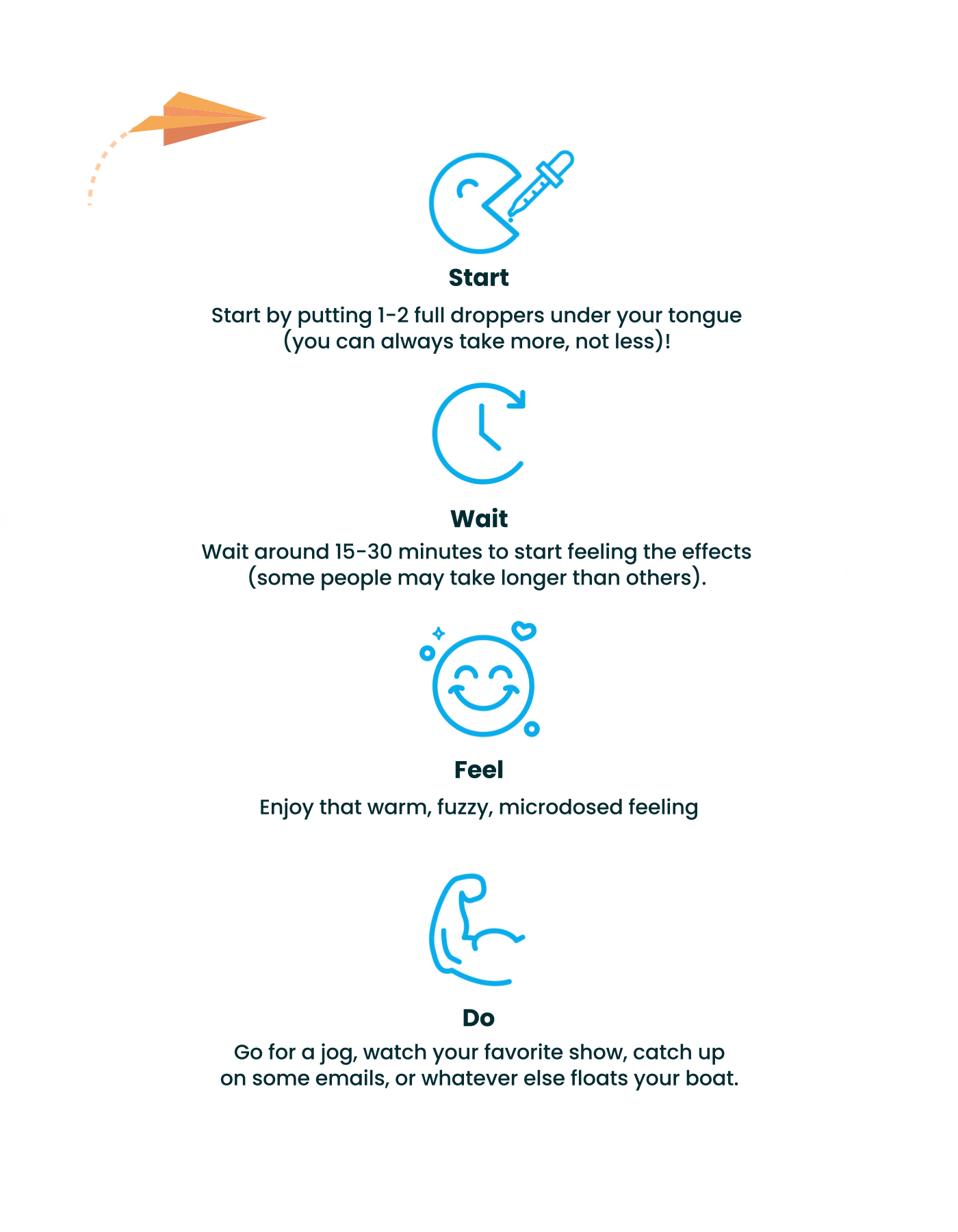
Us Vs. Them
Now Every Day Can Feel Like A Vacay.
OOO
OIL DROPS
THE OTHER
GUYS
A dose you can feel
Delicious (duh!)
Organically Grown Hemp
MCT Oil
Vegan & Gluten Free
Everyone is Talking
You’ve Got Questions
We’ve Got Answers.
Out of Office Oil Drops are MCT oil infused with tetrahydrocannabinol, the main psychoactive component of cannabis. They work by being absorbed through the digestive system, releasing THC into the bloodstream, which interacts with the body's endocannabinoid system and produces various effects, such as relaxation or euphoria.
Effects of Out of Office Oil Drops can include a sense of calm, euphoria, an altered perception of time, increased appetite, and in some cases, impaired cognitive and motor functions. These effects depend on the THC dosage and individual tolerance levels.
Start with a low dose, such as 1.5-3mg, and wait at least two hours to understand the effects before considering consuming more. Factors such as body weight, metabolism, tolerance, and the desired result will influence the ideal dosage.
Best practices include starting with a low dose, waiting to understand the full effects before consuming more, storing gummies safely out of reach of children and pets, and not driving or operating heavy machinery after consumption. Always stay hydrated and consume Out of Office Oil Drops in a comfortable and safe environment.
By clicking "Enter" you verify that you are 21 years of age or older.
THC Tincture
What Is THC Tincture?
THC tincture is a liquid extract made from cannabis plants. It typically contains a high concentration of THC (tetrahydrocannabinol), the primary psychoactive compound found in cannabis. Tinctures are usually created by soaking cannabis in alcohol or another solvent, which extracts the THC and other cannabinoids from the plant material. The result is a potent liquid that can be taken sublingually (under the tongue), added to food or beverages, or used in various recipes.
THC tinctures offer a discreet and convenient way to consume cannabis, especially for those who prefer not to smoke or vaporize. They allow for precise dosing, making it easier for users to control their intake and achieve the desired effects. Due to their high concentration, a small amount of tincture can provide significant effects, making them a cost-effective option for many users.
How Is THC Tincture Made?
The process of making THC tincture involves several steps to ensure a potent and pure product. Here’s a breakdown of the typical method:
Decarboxylation
First, the cannabis plant material is heated to activate the THC. This process, known as decarboxylation, converts THCA (tetrahydrocannabinolic acid) into THC, the compound responsible for the psychoactive effects. Decarboxylation typically involves heating the cannabis at a low temperature (around 220°F or 105°C) for 30-45 minutes. This step is crucial as it ensures the THC is active and bioavailable, making the tincture effective.
Extraction
Once decarboxylated, the cannabis is soaked in a solvent such as high-proof alcohol. The alcohol helps to dissolve the cannabinoids, terpenes, and other beneficial compounds from the plant material. This mixture is usually stored in a cool, dark place for several weeks, allowing the alcohol to extract the maximum amount of active ingredients. During this period, the container is occasionally shaken to ensure thorough extraction.
Straining
After allowing the mixture to sit for several weeks, it is strained to remove the solid plant material. This leaves behind a concentrated liquid extract. The straining process often involves using fine mesh strainers or cheesecloth to ensure all plant matter is removed, resulting in a clear tincture. This step is important to achieve a smooth, palatable product without unwanted plant residues.
Evaporation
In some cases, the alcohol is partially evaporated to increase the potency of the tincture. This step must be done carefully to avoid degrading the THC. Evaporation can be achieved by leaving the tincture uncovered in a well-ventilated area or using gentle heat. However, it’s crucial to avoid high temperatures, as they can cause the THC to degrade, reducing the tincture’s effectiveness.
Bottling
The final tincture is then bottled, often in dark glass containers to protect it from light degradation. Droppers are typically used for precise dosing. Dark glass helps to prevent exposure to light, which can degrade cannabinoids over time. Bottling the tincture in this manner ensures it remains potent and effective for an extended period, providing users with a reliable and consistent product.
What Are The Different Benefits Of THC Tincture?
THC tinctures offer several benefits, making them a popular choice for both medical and recreational cannabis users. Here are some key advantages:
Precise Dosing
Tinctures allow users to measure their dosage accurately using a dropper, making it easier to control the amount of THC consumed and tailor it to individual needs. This precision is particularly beneficial for medical users who need consistent dosing to manage their conditions. It also allows for gradual dose adjustments, minimizing the risk of overconsumption and adverse effects.
Fast Absorption
When taken sublingually (under the tongue), THC tinctures can be absorbed quickly into the bloodstream, leading to faster onset of effects compared to edibles. This method bypasses the digestive system, providing relief in as little as 15-45 minutes. This rapid onset makes tinctures an excellent option for those needing quick symptom relief, such as for acute pain or sudden anxiety.
Discreet Us
Tinctures are odorless and easy to use, making them a discreet option for consuming cannabis without drawing attention. They can be added to food or beverages for a more subtle intake method. This discretion is ideal for users who need to medicate in public or professional settings without the telltale smell of cannabis smoke or vapor.
Long Shelf Life
Properly stored THC tinctures can maintain their potency for a long time, often over a year. The alcohol used in tinctures acts as a preservative, extending the product's shelf life. This makes tinctures a cost-effective option, as users can purchase larger quantities without worrying about the product degrading quickly.
Versatility
THC tinctures can be used in various ways, such as sublingually, mixed with food or drinks, or incorporated into recipes. This versatility allows users to enjoy cannabis in a manner that suits their preferences. Whether you prefer a quick sublingual dose, an infused meal, or a soothing drink, tinctures can adapt to your lifestyle and needs.
Health Benefits
Many users report that THC tinctures help with various health issues, including chronic pain, inflammation, anxiety, and sleep disorders. The rapid onset and adjustable dosing make it easier to manage these conditions effectively. By providing a non-smoking option, tinctures also offer a healthier alternative for those concerned about the respiratory effects of smoking cannabis.
How Do You Use THC Tincture?
Using THC tincture is straightforward and can be done in several ways, depending on your preference and desired effects. Here are the most common methods:
Sublingual Application
Steps: Place the desired dose of tincture under your tongue using the dropper. Hold it there for 30-60 seconds before swallowing. This allows the THC to be absorbed directly into the bloodstream through the mucous membranes under the tongue.
Benefits: This method allows for quick absorption into the bloodstream, leading to faster onset of effects, typically within 15-45 minutes. The rapid onset is ideal for those seeking immediate relief from symptoms such as acute pain or anxiety. Additionally, this method allows for precise control over the dosage, making it easier to adjust the amount as needed.
Adding To Food Or Beverages
Steps: Mix the tincture into your favorite food or drink. This can include smoothies, soups, teas, or any recipe that calls for liquid ingredients. Ensure the tincture is evenly distributed to avoid inconsistent dosing.
Benefits: This method provides a more gradual onset of effects, as the THC is absorbed through the digestive system. It can take anywhere from 30 minutes to 2 hours to feel the effects, offering a longer-lasting experience. This approach is discreet and can easily be incorporated into your daily routine, making it convenient for those who prefer not to use cannabis in its more traditional forms.
Direct Consumption
Steps: Swallow the tincture directly without holding it under your tongue. Simply measure the desired dose with the dropper and ingest it.
Benefits: Similar to adding it to food or drinks, this method results in a slower onset of effects due to the digestive process. The effects tend to last longer, providing sustained relief for conditions such as chronic pain or insomnia. This method is straightforward and requires no preparation, making it a quick and easy option.
Topical Application
Steps: Some users apply tincture directly to the skin, particularly on sore muscles or joints. This can be done by massaging a small amount of tincture into the affected area.
Benefits: While this method is less common and typically less effective for experiencing psychoactive effects, it may provide localized relief for certain conditions. Topical application is useful for targeting specific areas of pain or inflammation without affecting the rest of the body. This method is ideal for users seeking relief from muscle soreness, arthritis, or skin conditions without experiencing the psychoactive effects of THC.
What Are Some Potential Side Effects Of THC Tincture?
While THC tinctures offer numerous benefits, they can also have potential side effects. It’s important to be aware of these so you can use the tincture safely and responsibly. Common side effects include:
- Dry Mouth: Also known as cottonmouth, this is a common side effect of THC. It occurs because THC can inhibit saliva production, leading to a dry, uncomfortable feeling in the mouth.
- Dizziness or Lightheadedness: Some users may feel dizzy or lightheaded, especially when standing up quickly. This can be a result of THC’s impact on blood pressure and circulation.
- Increased Heart Rate: THC can cause a temporary increase in heart rate, which might feel uncomfortable for some users. This effect is usually mild but can be more pronounced in higher doses.
- Paranoia or Anxiety: Higher doses of THC can sometimes lead to feelings of paranoia or anxiety, especially in individuals prone to these conditions. This can be unsettling and distressing.
- Impaired Coordination: THC can affect motor skills and coordination, making tasks like driving or operating machinery dangerous. This impairment can increase the risk of accidents and injuries.
- Drowsiness: THC can cause drowsiness or fatigue, which might be beneficial for those using it as a sleep aid but can be inconvenient during daytime use. This sedative effect can impact daily activities and productivity.
Understanding these potential side effects can help you use THC tinctures more safely and effectively. By being mindful of how your body reacts and adjusting your dosage accordingly, you can minimize adverse effects and maximize benefits.
What Is The Legal Status Of THC Tincture?
The legal status of THC tincture in the United States is complex and varies significantly from state to state. Here are some key points to consider:
Federal Law
The legal status of THC tincture in the United States is complex and varies significantly from state to state. Under federal law, THC is classified as a Schedule I controlled substance, making it illegal. This classification means that, at the federal level, THC products, including tinctures, are considered to have a high potential for abuse and no accepted medical use. However, the 2018 Farm Bill legalized hemp-derived products containing less than 0.3% THC. This has led to the widespread availability of CBD tinctures with trace amounts of THC, but it does not change the legality of THC tinctures derived from marijuana.
State Laws
Many states have legalized cannabis for medical use. In these states, patients with qualifying medical conditions can obtain THC tinctures from licensed dispensaries with a medical marijuana card. Each state has its own list of qualifying conditions and regulations governing the medical cannabis program. A growing number of states have also legalized cannabis for recreational use. In these states, adults over the age of 21 can purchase THC tinctures from licensed dispensaries without the need for a medical marijuana card. States with legal recreational cannabis include Colorado, Oregon, and others. Some states still prohibit all forms of cannabis, including THC tinctures. In these states, possession, sale, and use of THC products can result in legal penalties. It is crucial to check the specific laws in your state to understand what is permitted.
Purchasing And Traveling With THC Tincture
Ensure you purchase THC tincture from reputable, state-licensed dispensaries to guarantee quality and compliance with local regulations. Look for lab-tested products to ensure safety and potency. Be cautious when traveling with THC tinctures. It is illegal to transport THC products across state lines, even if both states have legalized cannabis. Additionally, TSA security screenings at airports are governed by federal law, which still prohibits THC.
Staying Informed
Cannabis laws are rapidly evolving, so it’s important to stay informed about the current regulations in your area. Check your state government’s website or consult legal experts to understand the specific laws that apply to you. Regular updates to state laws can significantly impact the legal status of THC tinctures and other cannabis products.
Sources:
- Manzanares, J., Julian, M., & Carrascosa, A. (2006). Role of the cannabinoid system in pain control and therapeutic implications for the management of acute and chronic pain episodes. Current Neuropharmacology, 4(3), 239–257. https://www.ncbi.nlm.nih.gov/pmc/articles/PMC2430692/
- Stoner, S. (2017). Effects of Marijuana on Mental Health: Anxiety Disorders Considering Locked vs. Unlocked Treatment Facilities. https://adai.uw.edu/pubs/pdf/2017mjanxiety.pdf
- National Academies of Sciences, Engineering, and Medicine, Health and Medicine Division, & Board on Population Health and Public Health Practice. (2017, January 12). Therapeutic Effects of Cannabis and Cannabinoids. Nih.gov; National Academies Press (US). https://www.ncbi.nlm.nih.gov/books/NBK425767/
- Kaul, M., Zee, P. C., & Sahni, A. S. (2021). Effects of Cannabinoids on Sleep and their Therapeutic Potential for Sleep Disorders. Neurotherapeutics, 18. https://doi.org/10.1007/s13311-021-01013-w
- Tramer, M. R. (2001). Cannabinoids for control of chemotherapy induced nausea and vomiting: quantitative systematic. BMJ, 323(7303), 16–16. https://doi.org/10.1136/bmj.323.7303.16
- Malfitano, A. M., Proto, M. C., & Bifulco, M. (2008). Cannabinoids in the management of spasticity associated with multiple sclerosis. Neuropsychiatric Disease and Treatment, 4(5), 847–853. https://www.ncbi.nlm.nih.gov/pmc/articles/PMC2626929/
- National Institute on Drug Abuse. (2020, July). How does marijuana produce its effects? National Institute on Drug Abuse. https://nida.nih.gov/publications/research-reports/marijuana/how-does-marijuana-produce-its-effects

